Veneers in Taiwan
Search and Compare the Best Clinics and Doctors at the Lowest Prices for Veneers in Taiwan
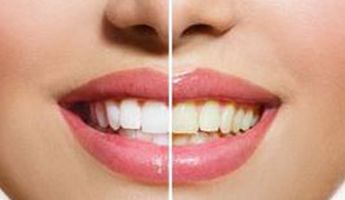
Find the best clinics for Veneers in Taiwan
With Medijump you can browse 3 facilities offering Veneers procedures in Taiwan. The cheapest price available is $1,105 in Taipei. And for the cheapest price globally, prices start from $1 in Vietnam.
Veneers in Taipei
Price: $ 1,105
Vietnam offers the best prices Worldwide
Price: $ 1
From 128 verified reviews
ashley kauffman, 21 September 2020
At NTU hospital they are constantly processing high volumes of patients efficiently and with a happy attitude. I was in and out for my follow-up in less than 30 mins. Moreover, my previous recent experience in the ER department was very positive. All of the doctors and many of the staff can speak English. What’s more, they offer online appointment booking in English. The best place in Taiwan to go for any serious health concerns. The attitude of the staff is impressive considering how busy it gets.
From 136 verified reviews
Nana Hong, 18 September 2020
皮膚科彭家盈醫師問診親切仔細,五顆星是給她的
The Perfect Smile Clinic Taipei, located in Taipei City, Taipei, Taiwan offers patients Veneers procedures among its total of 41 available procedures, across 3 different specialties. The cost of a Veneers procedure ranges from NT$35,000 to NT$35,000, whilst the national average price is approximately NT$34,997. There are many specialists available at the Dental, with 15 in total, and they are not accredited by any recognized accreditations institutes
- Home
- Taiwan
Compare Before & After Photos of _procedure_photos.phpVeneers
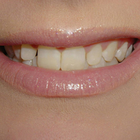
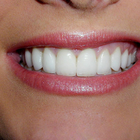
Front view
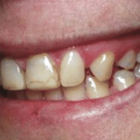
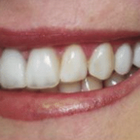
Half-side view
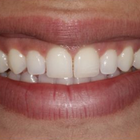
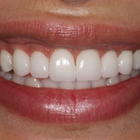
Front view
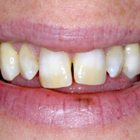
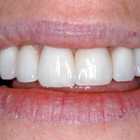
Front view
WHY US?
At Medijump, we're making medical easy. You can search, compare, discuss, and book your medical all in one place. We open the door to the best medical providers worldwide, saving you time and energy along the way, and it's all for FREE, no hidden fees, and no price markups guaranteed. So what are you waiting for?

Free

Best Price

Widest Selection

Risk-Free
What you need to know about Veneers in Taiwan

Dental veneers are thin covers that are attached to the surface of teeth to enhance their appearance. The non-invasive dentral procedure is previously popular among those with damaged or discolored teeth. Nowadays, however, the procedure is seen as the ideal method of achieving the ‘perfect smile.'
Veneers can be used to hide uneven, misaligned or simply imperfect teeth. The veneers are cemented over the existing teeth and fixed into place – there are two main types of veneer; Porcelain and Composite. Porcelain veneers are more expensive and appear more natural, being made in a laboratory so require multiple visits. There is often the need to alter the existing teeth, removing some of the mass. Composite veneers are made of the same materials used for cavity fillings. They can usually be made quickly, and are sculpted directly on the teeth instead of in a laboratory. Thus allowing the procedure to be done in a day.
What does a Veneers Procedure Involve?
Veneers are used primarily for aesthetics. This type of treatment procedure is perfect for people who have gaps in their teeth, stains, as well as people who may have chipped a tooth. Veneers are custom-made shells designed to fit the shape of your teeth and to be attached to your front teeth to improve the size, shape, color, and length.
Two main types of veneers are:
- Composite Veneer - this type can be created by your dentist on the same day and directly applied to your teeth. You will only need a single appointment to complete the procedure.
- Porcelain Veneer - this type is manufactured in a laboratory. Opting for a porcelain veneer will require you to have two appointments. First, is to prepare your teeth (enamel removal) and mold a model of your teeth to be created in the lab. The second is to finally cement your veneers onto your teeth.
The most commonly used type of Veneer is the Porcelain Veneer as it appears more natural and can resist stains better than composite veneers. Besides the two main types of veneers, some dentists may also offer no-prep veneers. These may include specific brands of procelain veneers like Vivaneers and Lumineers. They are less invasive to apply since the layers of tooth under the enamel aren't removed.
In terms of anesthetics, local anesthesia is not usually required while undergoing the whole procedure. However, depending on how you handle pain and discomfort, you may request to receive local anesthesia or sedation.
Aside from giving you a pleasing smile, veneers are resistant to staining and offer the best fix to broken or damaged teeth.
How Long Should I Stay in Taiwan for a Veneers Procedure?
This type of procedure is an outpatient treatment, meaning you may be able to go home after undergoing the procedure. However, you will be required to do a follow-up check-up with your dentist to assess the placement of your veneers and in most cases, the procedure has to be carried out over 2 separate occasions, just a day or two apart. Since this is a non-invasive treatment, stitches are not required, but you will be required to stay in Taiwan for at least a few days.
What's the Recovery Time for Veneers Procedures in Taiwan?
There is actually no recovery time after the placement of your veneers. You can also return back to your daily routines including exercise immediately after your trip. As for the enamel removal, you may experience some mild discomfort for about a week. It is best that you avoid very hot or cold foods, including hard, chewy or crunchy food. When your sensitivity wears off, you can return to your normal dietary habits.
What sort of Aftercare is Required for Veneers Procedures in Taiwan?
Once your dental veneers have been placed and you have completed the whole procedure, you should commit yourself to good oral hygiene, regular visits to your dentist and a good healthy lifestyle. Dental Veneers can last beyond 10 years now, however, just like your natural teeth, veneers are also still susceptible to damage. This is why aftercare is very important to help with the longevity of your new teeth.
What's the Success Rate of Veneers Procedures in Taiwan?
Over the past years, many studies have reported that over 91% of people who have had dental veneers experienced highly positive results. However, potential risks and side effects after undergoing this procedure are a possibility. Just like any other dental restoration, dental veneers can have some side-effects, for example:
- Tooth sensitivity - since this procedure will require the removal of some enamel, your teeth will become slightly sensitive, following the placement of your veneers.
- Response from gum tissues - your gum tissue might take some time to adjust to your newly placed veneers. Expect to have some minor inflammation and/or discomfort in your gums.
- Risk of trauma - once your teeth’s enamel is removed, it will become more sensitive, thus it will be even possible for the pulp within your teeth to die.
- Possible Issues with placement - it's possible for your teeth to have issues with decay or chipping along the outer portion of your veneers. Gum irritation may also be possible. Other problems may include rough-edged veneers and overhanging veneers.
- Overall Discomfort - experiencing some discomfort after the procedure is to be expected. If you are particularly sensitive, it is advisable that you take an over the counter medication to help you relax and treat your pain.
Are there Alternatives to Veneers Procedures in Taiwan?
You also have to be aware that this type of treatment option is not for everyone. If you are not a good candidate to undergo the procedure, note that there are still possible alternatives that will be suited for you. These alternatives may include:
Orthodontics - if you have severely crooked teeth or malocclusion, dental veneers are not for you. You may want to consider a more comprehensive orthodontic procedure to treat your case.
Dental crowns - these are quite similar to dental veneers. These are also custom-made to match the shape of your teeth. However, unlike veneers, a crown extends all the way around your tooth, meaning your dentist will remove a large portion of your dental structure. These crowns are perfect for patients who have considerable damage that affects the strength and structure of their teeth.
Bonding - often called composite veneers. This is typically for patients with an insufficient amount of tooth enamel.
Whilst the information presented here has been accurately sourced and verified by a medical professional for its accuracy, it is still advised to consult with your doctor before pursuing a medical treatment at one of the listed medical providers
No Time?
Tell us what you're looking for and we'll reachout to the top clinics all at once
Enquire Now

Popular Procedures in Taiwan
Prices Start From $1

Prices Start From $1

Prices Start From $48

Prices Start From $1

Prices Start From $1

Prices Start From $1

Prices Start From $11

Prices Start From $45

Recommended Medical Centers in Taiwan for Veneers

- Interpreter services
- Translation service
- Religious facilities
- Medical records transfer
- Medical travel insurance
- Health insurance coordination
- TV in the room
- Safe in the room
- Phone in the room
- Private rooms for patients available

- Interpreter services
- Translation service
- Religious facilities
- Medical records transfer
- Medical travel insurance
- Health insurance coordination
- TV in the room
- Safe in the room
- Phone in the room
- Private rooms for patients available

- Interpreter services
- Translation service
- Religious facilities
- Medical records transfer
- Medical travel insurance
- Health insurance coordination
- TV in the room
- Safe in the room
- Phone in the room
- Private rooms for patients available
Veneers in and around Taiwan
About Taiwan
Whilst still a part of the Republic of China, the small island of Taiwan maintains a wealth of ancient Chinese culture and traditions mixed with modern-day Western inspirations. With its food-loving locals and award-winning whiskeys, Taiwan is a land of surprises. With 14 JCI accredited facilities in Taiwan, Taipei, the capital, is home to most, many of which are part of the University Hospitals and offer a range of specialist tertiary care. The country welcomes an ever-increasing number of medical tourists each year, many of which travel for Veneers procedures. Medical Tourists mostly travel from the mainland or from within the region.
Popular parts of Taiwan
Taiwan is one of the most densely populated countries in the world with 23.5 million inhabitants. The country has amazed tourists with its dynamic cities, vibrant culture, interesting history, and incredible natural scenery.
- Taipei is the capital of Taiwan. It is the financial, political, and cultural center of the country. The city is influenced by Chinese culture as well as Japanese, Southeast Asian, and American. There are many things to enjoy in this city, such as delicious food in Rahoe Night Market, enjoy a bird’s eye view of Taipei from Taipei 101 Observatory, visit the incredible Chiang Kai-shek Memorial Hall, and be inspired by the city’s many museums.
- Kaohsiung is Taiwan’s largest port. It’s an urban city that embraces its cultural venues. The most popular tourist destination is the Lotus Pond, a beautiful artificial lake filled with lotus plants and surrounded by temples. Tourists can also visit Pier-2 Art Center, see the Dome of Light, explore Cijin Island, or visit the Fo Guang Shan Monastery.
- Tainan, as the oldest city in Taiwan, has a fascinating culture and history. For historical sights, tourists can visit the Anping Fort, Anping Tree House, or learn Taiwanese embroidery. The city is now filled with quaint cafes tucked within the alleys.
- Hualien has breathtaking natural beauty. It’s the perfect place for tourists who want to get away from busy cosmopolitan cities. Visit the Eternal Spring Shrine, check out the popular Taroko Gorge, fall in love with Qingshui Cliffs, hike the Shakadang trail, and eat the amazing food.
- Taichung is a lively city located in the west-central part of the island. Taichung offers many unique things to see and do. National Taichung Theater will leave tourists in awe by its beautiful architecture. National Taiwan Museum of Fine Arts, Rainbow Village, Gomei Wetlands, Miyahara, and Fengjia Night Market are among the most popular tourist attractions.
Weather and Climate in Taiwan
- Spring starts in March and lasts until May. The average temperature is between 18°C and 24°C. Early rain showers and thunderstorms begin in this season. Heavy rainfall hit the island around mid-May.
- Summer can get extremely hot and humid with an average temperature of 27°C to 30°C. The season starts from June to August. Summer is also the wet season and typhoons are a real possibility especially in July and August. This is the peak season for tourism.
- Autumn has pleasant weather conditions. The rains decrease and the heat will drop. The season starts from September to November with an average temperature of 21°C to 27°C.
- Wintertime is from December to February and it is the coolest and driest season of the country. The average temperature drops to 16°C - 18°C.
Getting Around in Taiwan
Taiwan Taoyuan International Airport is the main airport in the country, located about 40km west of Taipei in the Dayuan District, Taoyuan. It is the hub for 6 airlines including two of Taiwan’s major airlines, China Airlines, and EVA Air. It has international connections with almost every country in the world. The airport serves major airlines as well as budget airlines such as Air Asia, Eastar Jet, Air Busan, and Tiger air Taiwan. There are other airports that serve international and domestic flights such as Taichung Airport, Tainan Airport, Siaogang Airport, and Taipei Songshan Airport.
Tourists arriving at Taiwan Taoyuan International Airport have a variety of transport options such as buses, taxis, car rentals, and Taoyuan Airport MRT. Buses are the cheapest option to get to the city center. Tourists who head towards the Taipei 101 area should take Bus no. 1960, while bus no. 1819 and 1961 will take tourists near Taipei Main Train Station.
Taxis are available in Terminal 1 and Terminal 2’ arrivals lobby. The fare is based on a meter and will usually cost around 1,200 TWD (40.50 USD). A journey to the city center takes about 50 minutes and taxis operate for 24 hours.
Taoyuan Airport MRT is the fastest way to reach Taipei’s city center. It will take tourists to Taipei Main Station in 35 minutes and costs 160 TWD (5.40 USD). The MRT operates from 6.05 am to 11.35 pm.
Tourists can travel around Taiwan by normal train (TRA). It is an affordable option; a train ride from Taipei to Kaohsiung costs around 845 TWD. Tourists who need a quicker travel time can opt for Taiwan High-Speed Train (HSR). The train travels from Taipei to Kaohsiung in just 90 minutes.
The cheapest way to travel around Taiwan is by bus. Buses are readily available and will reach small villages and mountain resorts. The country provides Taiwan Tourist Shuttle bus system that offers 42 routes to more than 100 tourist destinations.
Taxis and MRT is the best way to travel around big cities. In Kaohsiung, getting around in a bicycle is the best way to explore as it is one of the most bicycle-friendly cities in Taiwan.
Tourist Visas in Taiwan
Citizens of 65 countries do not require a visa to visit Taiwan and can stay for up to 90 days. Nationals of Turkey can obtain a visa on arrival valid for 30 days. It is best to check to the nearest embassy or consulate for visa requirements. Since January 2016, Taiwan offers an eVisa program for 18 countries including Saudi Arabia, Peru, Oman, and United Arab Emirates.
Additional Information
- Local Currency: The local currency is the New Taiwanese Dollar (TWD). 1 USD converts to 31.98 TWD.
- Money & Payments: ATMs are widely available except in villages. They’re usually located in convenience stores and banks. Credit cards are accepted in hotels and top-end restaurants. Always carry cash because small stalls and night market joints only accept cash. Tipping is not mandatory but is still appreciated.
- Local Language: The national language is Hakka, Mandarin, Taiwanese Hokkien, Matsu, Formosan languages, and sign language. English is common, especially in the tourism area. English is spoken more in Taipei.
- Local Culture and Religion: Taiwan has diverse religious beliefs. Buddhism and Taoism are two of the biggest religion in the country followed by Christianity, Yiguandao, Tiandism, Miledadao, Zailiism, and Xuanyuanism.
- Public Holidays: Taiwan celebrates Chinese New Year for a week in February. The country hosts several festivals such as Lantern Festival in February, Dragon Boat Festival in June, and Mid-Autumn Festival in September.
Popular Searches
- Plastic Surgery in Thailand
- Dental Implants in Thailand
- Hair Transplant in Thailand
- Breast Augmentation Thailand
- Gastric Sleeve in Thailand
- Gender Reassignment Surgery in Thailand
- Laser Hair Removal in Bangkok
- Botox in Bangkok
- Dermatology in Bangkok
- Breast Augmentation in Bangkok
- Coolsculpting in Bangkok
- Veneers in Turkey
- Hair Transplant in Turkey
- Rhinoplasty in Turkey
- Stem Cell Therapy in Mexico
- Rhinoplasty in Mexico
- Liposuction in Mexico
- Coolsculpting in Tijuana
- Rhinoplasty in Korea
- Scar Removal in Korea
- Gastric Sleeve in Turkey
- Bone Marrow Transplant in India
- Invisalign in Malaysia
- Plastic Surgery in the Dominican Republic
- Tummy Tuck in the Dominican Republic
- Plastic and Cosmetic Surgery in Poland
- Rhinoplasty in Poland
- Hair Implant in Poland
- Dental Implants in Poland
- IVF in Turkey


